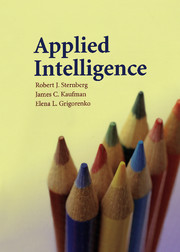Book contents
- Frontmatter
- Contents
- Preface
- 1 Views of Intelligence
- 2 The Theory of Successful Human Intelligence
- 3 Metacognition: Thinking with Metacomponents
- 4 Advanced Problem-Solving Steps
- 5 Cognitive Processing: Performance Components (I)
- 6 Cognitive Processing: Performance Components (II)
- 7 Logical Reasoning and Analysis of Arguments: Performance Components (III)
- 8 Inference and Inferential Fallacies
- 9 Knowledge-Acquisition Components
- 10 Coping with Novelty
- 11 Deciding for Creativity
- 12 Automatizing Information Processing
- 13 Practical Intelligence
- 14 Why Intelligent People Fail (Too Often)
- References
- Author Index
- Subject Index
1 - Views of Intelligence
Published online by Cambridge University Press: 09 November 2009
- Frontmatter
- Contents
- Preface
- 1 Views of Intelligence
- 2 The Theory of Successful Human Intelligence
- 3 Metacognition: Thinking with Metacomponents
- 4 Advanced Problem-Solving Steps
- 5 Cognitive Processing: Performance Components (I)
- 6 Cognitive Processing: Performance Components (II)
- 7 Logical Reasoning and Analysis of Arguments: Performance Components (III)
- 8 Inference and Inferential Fallacies
- 9 Knowledge-Acquisition Components
- 10 Coping with Novelty
- 11 Deciding for Creativity
- 12 Automatizing Information Processing
- 13 Practical Intelligence
- 14 Why Intelligent People Fail (Too Often)
- References
- Author Index
- Subject Index
Summary
What is intelligence? There have been countless studies and books on this topic, but we're going to focus on a primary distinction between traditional conceptions and newer conceptions. One new conception of intelligence is the theory of successful intelligence, in which being intelligent is more than just being book-smart; it is knowing how to apply it – hence our title, Applied Intelligence. We view intelligence as encompassing many diverse concepts, including critical thinking, being able to know how much you know (metacognition), common sense, practical intelligence, creativity, and logic. We believe that an intelligent person is someone who can tell (or who knows how to check) if a forwarded e-mail is truth or an urban legend; someone who can recognize propaganda versus more convincing arguments; someone who usually has a good idea of how much he or she knows about something; someone who can adapt to new situations; and someone who can learn new things.
Before we discuss the theory of successful intelligence, we're going to attempt to briefly summarize more than one hundred years of research about intelligence and IQ testing. This chapter, therefore, will present a brief overview of the way psychologists and others have conceived of intelligence. For more details, see Sternberg (1990, 1994, 2000, 2004b; Sternberg, Lautrey, & Lubart, 2003; Cianciolo & Sternberg, 2004).
- Type
- Chapter
- Information
- Applied Intelligence , pp. 1 - 23Publisher: Cambridge University PressPrint publication year: 2008



